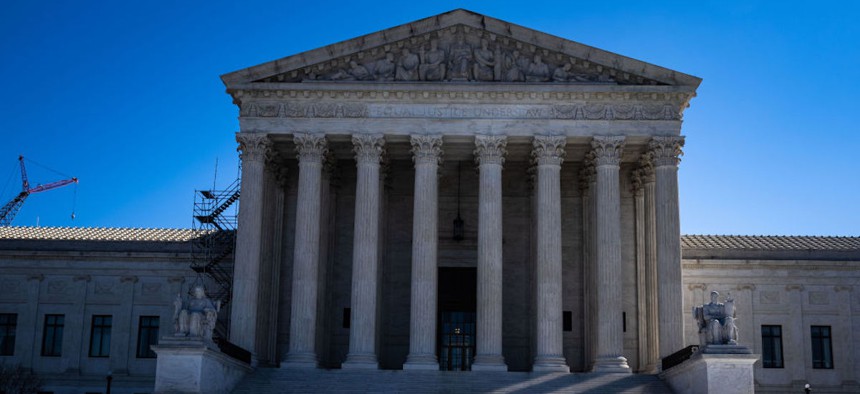Should public officials be allowed to block constituents on social media?

Kent Nishimura / Los Angeles Times via Getty Images
The U.S. Supreme Court is set to answer that question as a new term gets underway. The justices will hear two cases on the issue out of California and Michigan in which lower courts ruled differently.
The U.S. Supreme Court begins its fall term today, and two related cases with two conflicting prior rulings pending before the justices could determine whether public officials can block constituents on their personal social media accounts.
The first case, O’Connor-Ratcliff vs. Garnier, will answer the question: Does blocking constituents from a personal social media account that is used to communicate with the public violate their First Amendment rights?
The case stems from a lawsuit brought against Michelle O’Connor-Ratcliff and T.J. Zane, trustees of the Poway Unified School District near San Diego. The pair had blocked two parents, Christopher and Kimberly Garnier, after they criticized them on their personal social media accounts.
In the ensuing court case, the U.S. Court of Appeals for the 9th Circuit found that the trustees’ blocking of the parents constituted government action, and therefore ruled in favor of the Garniers.
The two respondents appealed to the Supreme Court last fall, pointing to a similar case that had reached a different conclusion. In that case, Lindke vs. Freed, the U.S. Court of Appeals for the 6th Circuit ruled that James Freed, the city manager of Port Huron, Michigan, did not violate Kevin Lindke’s rights when he blocked him on social media.
The blocking came after Lindke left comments on Freed’s Facebook page criticizing his handling of the COVID-19 pandemic. Lindke appealed the decision to the Supreme Court, which agreed to hear it.
In both cases, plaintiffs alleged that their blocking on social media constituted a “state action,” as it deprived them of the right to free speech.
The appeals court in the case involving the two school district trustees found that while their personal social media accounts are not maintained using public funds, they used those pages to communicate about “events which arose out of their official status,” and matters they could only discuss due to their positions. The court found that the parents’ blocking was “not adequately tailored to an appropriate government interest.”
In the Lindke case, the appeals court found that “social media activity may be considered a state action when it is part of the officeholder’s actual or apparent duties, or couldn’t happen in the same way without the authority of the office,” wrote Susan Frederick, senior federal affairs counsel at the National Conference of State Legislatures, in a blog post.
But the court determined there was no legal or occupational requirement for Freed to operate social media accounts, and that no public funds were used in their operation.
The court rejected that Freed used his personal page to communicate with the public about his job, saying “[w]hen Freed visits the hardware store, chats with neighbors or attends church services, he isn’t engaged in state action merely because he’s ‘communicating’—even if he’s talking about his job.”
In the blog post, Frederick wrote that these cases will help “define when an official’s use of social media should be considered personal and when it should be considered a governmental function.”
The future of a Colorado law would be impacted by the justices’ decisions in these two cases. In June, Gov. Jared Polis signed legislation giving all elected officials in the state the power to block someone from viewing or engaging with their personal social media pages for any reason. Those in favor of the bill, which passed earlier this year, said at the time it would protect elected leaders from abuse on social media.
The actions that led to the law in Colorado are set for scrutiny, too. Like the two cases before the high court, a constituent is alleging First Amendment violations. Denver parent Eve Chen filed a federal lawsuit last week against a school board member for blocking her from viewing or posting on his Facebook page.
These cases follow several other high-profile disputes over the years about whether government officials can block constituents from personal social media accounts. Former President Donald Trump in 2021, for example, asked the Supreme Court to overturn a ruling that found he violated the First Amendment by blocking people on Twitter who criticized him. The Supreme Court ultimately sent the case back to the lower court with instructions to dismiss the case as Trump was no longer president.
Justice Clarence Thomas warned at the time that the case “highlights the principal legal difficulty that surrounds digital platforms—namely, that applying old doctrines to new digital platforms is rarely straightforward.”
Both cases are slated to be argued before the court on Oct. 31, and could be consolidated. A decision is expected sometime next year.






